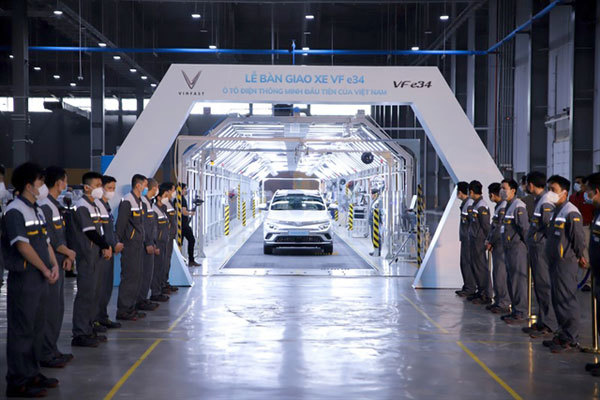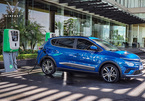 |
| The first VinFast VF e34 electric cars ready roll off the production line at VinFast's Hai Phong factory. — Photo courtesy of VinFast |
The event marks the beginning of the electric car era in Vietnam, making Vietnam one of the few countries in the world that has mastered clean energy car production technology. The first batch of 100 cars was handed over last Saturday. Another 2,000 will be sold in January 2022.
The event has also sparked a race between local and foreign carmakers. The Japanese car firm Toyota made a surprise announcement that they will begin selling e-cars in Vietnam next year too.
Akio Toyoda, President and CEO of Toyota Global, said that the Japanese automaker will start production of The Toyota bZ series ("beyond Zero"), a family of battery electric vehicles (BEV). The all-new bZ series goes beyond zero emissions to transform lives and experiences.
Toyota is expected to launch three models of the bZ series next year, including in Vietnam. Toyota's Motomachi car factory is manufacturing the bZ4X model and will soon expand to other bZ models.
Do Nguyen Vuong, General Director of Volkswagen Vietnam Automobile Co., Ltd., had said that his company plans to sell e-cars in Vietnam but were waiting for more supporting infrastructure first. After Toyota announced they would be selling e-cars in Vietnam, Volkswagen decided to speed up its planned launch too.
General Director of Thaco Automobile Nguyen Quang Bao said the Sorento 7-Seater SUV of All-New Kia Sorento Hybrid will be sold in March 2022.
Another hybrid model, the Kia Sportage, will also go on sale in June 2022. In particular, the Kia EV6, the company's first all-electric car with super-fast charging battery technology, is also expected to go on sale in the second quarter of 2022.
A representative of Nissan Vietnam also announced that his company has prepared a strategic plan to develop electric cars that will soon launch in Vietnam. Mitsubishi have already displayed its electric cars at a car show in Vietnam two years ago and will sell e-cars in Vietnam, after retailing this model in other countries in the region.
Future choices
Akio Toyoda acknowledged that pure electric vehicles were one of the most promising means of transport of the future.
Toyota plans to expand the production of carbon-neutral vehicles. By 2030, Toyota aims to have 30 pure electric passenger and commercial cars.
A representative of the Vietnam Automobile Manufacturers Association (VAMA) said that, because the price of electric vehicles is still quite high and the infrastructure has not been fully invested, it is a struggle to attract consumers. However, the fact that so many car makers are launching electric cars creates more competition and choice for consumers.
To attract customers to electric cars, it is necessary to have a preferential policy to invest in battery charging stations, and cut or exempt fees and taxes to lower prices, said the representative.
Do Nguyen Vuong said that Volkswagen was expected to sell its electric SUV cars at a price of VND1.8 billion and VND1.3 billion for sedan models in Vietnam. Vuong said if Vietnam offered a preferential policy for electric cars, the price could be lower and become more attractive to consumers.
Source: Vietnam News

Once-in-a-lifetime opportunity to rewrite development scenario for VN auto industry
Developing electric vehicles is a "golden opportunity" that comes once every hundred years and a chance for Vietnam to rewrite the development scenario for the auto industry.

Vingroup to launch electric cars in the US, raise US$1 billion
Vingroup, owned by Vietnam’s richest man Pham Nhat Vuong, plans a billion-dollar deal as its subsidiary with electric car models VF e35 and VF e36 enter the US market.